- AppliancesElectriciansHVACLandscapingLocksmithPest ControlPlumbingRenovationRoofingT V RepairAll Home Improvement
- Car AccidentClass ActionCorporate LawCriminal DefenseDivorce LawEmployment LawFamily LawFinancial LawLegal AidMedical Injury LawyersMedical MalpracticeReal Estate LawWater Fire RestorationAll Legal
- InvestmentRetirementAll Finance
- Animal InsuranceAutoGeneral InsuranceHealth PolicyHome RentersAll Insurance
- DentalHealth SpecialistsAll Medical
- Animal CareVeterinaryAll Pets
- Auto GlassTowingAll Automotive
Here's How to Recycle Your Old Electronics

Recycling unwanted electronics is an excellent way to reduce the amount of space taken up by landfills and do your part to protect the planet. Fortunately, there are plenty of affordable and convenient ways to recycle electronics like TVs, printers and computers.
Find out where to access electronic recycling services and what to do with non-recyclable devices and batteries.
Most electronic items are suitable for electronic recycling. According to Consumer Reports, 25 states have laws that require citizens to recycle their electronics instead of throwing them in the garbage. Items usually suitable for electronic recycling include:
- TVs
- DVD players and VCRs
- Computers and electronic computer accessories
- Digital, cable and satellite boxes
- Cell phones
- Landline telephones
- Stereo equipment and radios
- Fire alarms
Generally, states decide which electronic items must be recycled based on whether they contain toxic chemicals that could leak and damage the environment. Therefore, even states with laws around electronic recycling often allow citizens to dispose of items like lamps, hairdryers and vacuum cleaners with regular household waste because they don't contain harmful chemicals. However, you'll need to remove the batteries first and dispose of them correctly.
Whatever the rules surrounding electronics disposal in your area, it's generally better for the environment to recycle electronics whenever possible.
How Do You Recycle Electronics?
You can recycle electronics at your local or state recycling facility or through an electronic-recycling program. You can find out where to look for electronic-recycling programs below.
You should remove any batteries from your device before recycling them because batteries require special disposal methods. If you're recycling a laptop, PC or another device that stores personal information, delete any identifying information before taking it to be recycled.
Many electronics manufacturers and retailers run programs that accept electronics for recycling, and some refurbish usable items to donate or sell. Many are enrolled in the Sustainable Materials Management Electronics Challenge program. You can find a place that will recycle your electronics by searching on the Environmental Protection Agency website.
How Do You Dispose of Electronics That Cannot Be Recycled?
If your electronic item is not recyclable, or you can't access recycling services, consider donating it to a good cause if it's still working. Various charities accept donations and either refurbish the electronics to redistribute to people in need or sell them to raise funds. Alternatively, you could sell your item to a private company that refurbishes electronics for resale or uses them for parts.
If these options are unavailable, your only other option is to dispose of your electronics at a landfill facility or with your household trash. Remove the batteries first to minimize the impact on the environment. However, it's important to check the rules around electronics disposal in your state first.
How Do You Recycle Batteries?
You can usually dispose of single-use alkaline and zinc-carbon batteries with your household trash. However, lithium, button-cell and rechargeable batteries should be disposed of at a recycling facility or through a battery-recycling program. You should be particularly careful when disposing of button cell batteries because they could cause serious health problems if swallowed by a child or animal.
Many retailers and manufacturers offer battery recycling services as part of their electronic recycling schemes. If you have a laptop, a tablet or another electronic item with a non-removable battery, you should dispose of the entire device at a recycling facility or through a scheme certified to recycle electronics or batteries. You can find local battery recycling facilities through the SMM search tool on the EPA website.
Do Retailers Recycle Electronics and Batteries?
Many electronics manufacturers and retailers are enrolled in the SSM program. Therefore, consumers can take unwanted electronics to their local stores to recycle or donate them.
Target stores have recycling stations where customers can dispose of various items, including small electronic devices like MP3 players and cell phones. Target partners with a vendor company that sells or refurbishes electronic items after removing any identifying data. Items unsuitable for resale or refurbishment are recycled.
Best Buy allows customers to dispose of up to three electronic devices per day in the store. The company charges a flat fee of $25 for certain items. Furthermore, it offers a 15% discount coupon for people who dispose of networking or storage devices through its program to encourage responsible disposal and reduce the amount of waste going to landfills.
Elocal Editorial Content is for educational and entertainment purposes only. Editorial Content should not be used as a substitute for advice from a licensed professional in your state reviewing your issue. Systems, equipment, issues and circumstances vary. Follow the manufacturer's safety precautions. The opinions, beliefs and viewpoints expressed by the eLocal Editorial Team and other third-party content providers do not necessarily reflect the opinions, beliefs and viewpoints of eLocal or its affiliate companies. Use of the Blog is subject to the
Website Terms and Conditions.The eLocal Editorial Team operates independently of eLocal USA's marketing and sales decisions.



